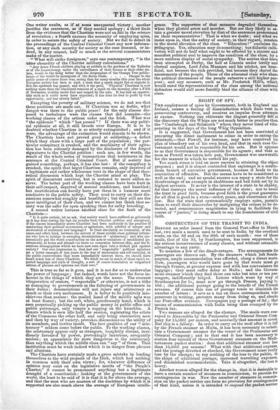RIGHT OF SPY.
THE employment of spies by Government, both in England and Ireland, causes a feeling of dissatisfaction which finds vent in persevering controversy, and receives an impulse from attempts at excuse. Nothing can obliterate the disgust generally felt at the discovery that the Whigs are not much better in practice than the "Castlereagh and Sidmouth " whom they never tired of vitu- perating in the days of the long Whig Opposition.
It is suggested, that Government has not been convicted of procuring the direct incitement to crime in order to entrap the criminals,—that Powell, for instance, may have contrived his plan of treachery out of his own head, and that in such case Go- vernment would not be responsible for his acts. But it appears to us that Government is responsible for its agents ; and that as soon as Powell was taken into pay, Government was answerable for the manner in which he earned his pay. Too much stress is laid on mere success in attaining the object proposed ; and it is almost contended that espionage is a merito- rious branch of executive government, because it leads to the conviction of offenders. But the means have to be considered as well as the end; and no special success can repay a state for the disadvantage of an example in shabbiness and bad faith set by its highest servants. It never is the interest of a state to be shabby, for that destroys the moral influence of the state; nor to break the trust in good faith, because good faith is the great guarantee for all that is good in a state—order, peace, and observance of the law. But the state that systematically employs spies, permits them to swell their discoveries by instigating the crimes to be de- tected, and countenances magistrates in lying to facilitate the course of "justice," is doing much to sap the foundations of civil faith.


























 Previous page
Previous page